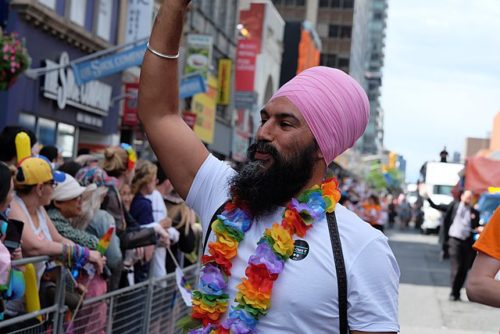SUBSCRIBE TO THE FREE NEWSLETTER
Cascadia Magazine original: Seattle’s HIV hope
A Seattle medical research center best known for its work on cancer has made significant advances in the search for a cure for HIV. In a fascinating feature online now at Cascadia Magazine, Niki Stojnic talks to virologists and advocates for people with HIV about what a pathway to a cure might look like. You’ll meet Tranish Arzah, who’s HIV-positive and supports women who have the disease, as well as Keith Jerome, a researcher with Fred Hutchinson Cancer Research Center who believes the search for a cure is more possible now than ever. “It’s the right time,” he says.
Read the full article online at Cascadia Magazine here.
British Columbia by-election stirs anti-immigrant anger
The Vancouver suburb of Burnaby is having an important by-election for a seat in the Canadian House of Commons tonight, with the NDP national leader Jagmeet Singh hoping to win in the riding. It’s been an ugly campaign, and the Star Vancouver has a sharp story on how Canada’s new “Trumpian” People’s Party has been stirring up a lot of anti-immigrant anger in the race. Ricochet Media calls on voters to reject the extreme populism of candidate Laura-Lynn Thompson of the PPC. CBC has profiles of each of the candidates.
New pipeline will kill orcas: Canadian energy board says “whatever”
Andrew Nikiforuk, writing for The Tyee, looks at the recent approval of the Trans Mountain pipeline across British Columbia by Canada’s National Energy Board. There’s a lot not to like in the decision, including the fact it proceeds even though NEB admits it will be devastating to the southern resident orcas, and will likely cost taxpayers billions more. Lynda Mapes at the Seattle Times has more on the report, and looks at how orcas in the Salish Sea are starving because of lack of salmon.
More housing density with less displacement
Vancouver needs a lot more housing to lower rents, and Christopher Cheung at The Tyee looks at a new data analysis that shows increasing density in transit corridors in Vancouver doesn’t have to mean a lot of displacement of low- or middle-income residents. Meanwhile Dan Fumano at the Vancouver Sun looks at the crisis facing lower-income rentals in Vancouver. And the Washington legislature is looking at reforming laws around condominiums, which are currently subject to many lawsuits, and as a result, few are being built.
Portland rules police shooting justified
OPB reports that the Portland police department has ruled that the shooting death of African American Andre Gladen was justified, even though questions have been raised about procedures. Portland Mercury interview Gladen’s family, who still have serious questions about the shooting.
Seattle Weekly ceases print publication
Crosscut reports that the alternative paper Seattle Weekly, founded in 1976, will halt print publication and shift to an online-only format. In related news, Daniel Walter at the Inlander notes that investigative journalism is a heck of a lot tougher now that you can’t just look up a person’s phone number in a phone book.
Native teen art in Seattle
Seattle Globalist reports on a new multi-disciplinary show of art by Native American teens at Seattle’s Vera project. The collection of art, music, video, poetry and more runs through Feb. 28. ““I think it’s very valuable especially because I feel like indigenous people aren’t really put forward especially in art spaces,” says one of the teens whose work is on display.
Poetry by Seattle’s Quenton Baker
Over at The Offing, read Seattle poet Quenton Baker’s “look how far we come/” a gorgeous and pointed meditation on the sea, blackness, and the Middle Passage:
“black enough to decrypt the wave at its crest
black enough to unhitch the ocean from its gangrenous wagon
to loosen one impossible hull
with our impossible breath”
Read the full poem here.
That’s today’s assortment of arts, news, poetry, environmental reporting and arts from across the Cascadia bioregion. Have a delightful evening! –Andrew Engelson

